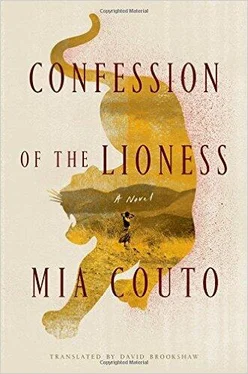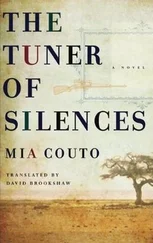We’ve got a sedan chair for you.
From then on, they began to carry me everywhere inside the coffin. From my palanquin, I would see people stop to show me a respect that they had never given me before. Happy with this general veneration, I declared:
Mother, I want to live in a coffin forever.
But such deference eventually prevented me from realizing that my vanity was indeed sad: I had to cease existing in order for people to take note of my existence. I should yearn for that other carriage of flesh and blood, which had given me such pleasure before: the backs of the other children. But no. Swaying from side to side up there on my improvised throne, my heart was filled with the vanity of a queen.
Just watch my breasts grow now!
Don’t wish for that, sister, don’t wish to be a woman , Silência warned.
* * *
One morning, I awoke to find the coffin in pieces. It was my grandfather, Adjiru Kapitamoro, who had broken it. The old man had unexpectedly strode across the yard and smashed the wooden box to pieces. I even heard him yelling at my parents:
How can you allow this type of tomfoolery? She’s a child, for God’s sake …
I remember I cried as I looked at the broken planks. When she saw me furiously digging in the sand, Silência thought I was looking for the statuette she had buried in the garden. But the grave had another purpose:
I’m burying my coffin.
* * *
All this happened before that unforgettable morning when, wearing my shoes and with my hair tidy, I went out with my grandfather. Nor did he explain the reason fully. Only these mysterious words: You’re going to receive the waters of God.
I was used to his fancifulness. It was he who, when I was still a young girl, had given me the name that would remain with me: Mariamar.
I’m not just giving you a name , he said. I’m giving you a ship to navigate between ocean and devotion.
These were his words on the occasion of my second baptism. And he said more: that I didn’t need a ritual to be a woman. The woman I would become was already within me.
* * *
That morning when Adjiru came to fetch me heralded a day when something important was going to happen. Preparations for going out were completed in a trice: A comb was plowed through my unkempt hair and my feet were squeezed into some improvised footwear.
Have you put your shoes on? my grandfather checked.
Why the need for shoes? For a long time now, they had been a mere ornament for me.
Do my parents know where we’re going?
Don’t be scared, I’m your principal grandfather.
And he chatted away while he tidied my hair.
Bless yourself, dear granddaughter. You’re going to receive a miracle.
What miracle, Grandfather?
You’re going to walk again.
Whether it was an illness or a curse, he couldn’t remain resigned in the face of my descent into the condition of a wild animal. He took a deep breath before declaring:
We have a proverb that goes like this: “If you can talk, you can sing; if you can walk, you can dance.” Well, you’re going to sing, you’re going to dance, my dear granddaughter.
I looked at his arm as if it were the continuation of my own body. And indeed it was. How could I ever cut my second umbilical cord? Oblivious to my thoughts, Adjiru Kapitamoro wheeled me through the village in a little barrow, with the pride of someone invited to inaugurate the square.
Framed by the church door, the priest, Manuel Amoroso, stood waiting for us. The Portuguese missionary was the only white man we knew. We didn’t distinguish the man by the color of his skin or by the language he spoke, or even by his vestments. What differentiated him from the rest was that he had no wife that we could discern. Nor children following in his footsteps.
Adjiru Kapitamoro! exclaimed the priest, putting a flourish on every syllable as if he were chortling a jaunty song.
Indeed, Father.
For the first time, my grandfather’s voice sounded fragile to me, as if it were seeking support. I looked at him against the light, as if to satisfy myself of his stature. And once again, I took a breath: Behind his outline, the church tower rose majestically. That was where our vertical journey to the firmament began. At that point, getting close to God seemed to me to require the effort of a mountaineer. The church was not inviting me to enter it, but rather to climb it.
I took time to get used to the brightness once inside. Then I began to adapt: I’d never seen a house with so much wall. The same cross hanging on Amoroso’s chest dominated, on a much vaster scale, the center of the building. Upon the wooden crucifix rested this world’s second white man: bearded, half naked, and covered in wounds.
Kneel before Christ , Amoroso ordered.
She can’t, Father. Have you forgotten why she’s come here to the mission?
Let us help her. She must do it.
The two men suspended me by my arms and then let go. I collapsed like a wet cloth. I lay spread-eagled on the floor and from that angle contemplated Amoroso and Christ. The two white men were alike: sad and wizened, as if life were happening in some other, inaccessible place. Christ displayed his wounds, Amoroso exhibited his bereaved gaze. Both of them summoned me toward the great family of the suffering. Toward the family that, only in suffering, feels close to God.
* * *
So have you come to a decision regarding my little girl?
My grandfather was irritated by the use of the possessive. My little girl?
This granddaughter of mine will always be mine, and I’m leaving her here only until she can walk again —these were his angry words as he left the church. I myself will come and fetch her and take her back to our home when she can stand on her own two feet , my grandfather promised emphatically.
The Portuguese priest didn’t seem to hear. He was totally absorbed in contemplating the church ceiling as if he were looking beyond what he was actually seeing. He stood there motionless, unaware that Adjiru had already left. He was satisfied: In a predominantly Muslim region, the representation of a miracle could bring in believers and approval. Smiling, he told me:
When your dear old granddaddy dies, he’ll go straight to heaven.
My grandfather will never die!
As far as I was concerned, Adjiru Kapitamoro’s life was that of a tree: Rooted in the ground, he already belonged to the sky.
* * *
My grandfather’s visits were the high point of the two years I spent at the mission. On some occasions, he would sit silently, gazing at the horizon. Other times, he wanted to know whether God was paying me any attention.
And how’s your writing? he would ask.
I’m always writing, Grandfather. Do you want to read it?
No, my dear. If I read, do you know what will happen? I’ll stop seeing the world. Read me the story of the queen of Egypt.
It was his favorite text. I already knew it by heart. Grandfather would close his eyes and I would recite it, always in the same tone:
It is said that Ra, the sun god of ancient Egypt, weary of the sins of men, created the goddess Sekhmet to punish those who needed to be punished. And that’s what the goddess did, with an excess of zeal, according to some. Sekhmet’s vengefulness even began to fall upon the innocent. In despair, the followers of Ra asked the god to help, but he was unable. So the Egyptians had the idea of creating a drink that was the color of blood, and they managed to inebriate the goddess. As a result, she fell asleep and once again fell under the control of Ra.
Читать дальше












